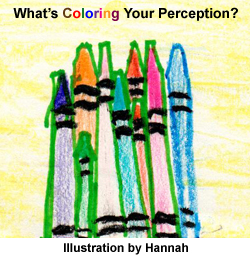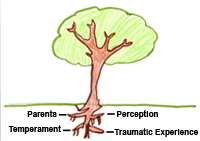 I am continuing our study on Emotions to discover how and when a negative response to life’s circumstances might have taken root in our life. In order to find the root, we must look at our past influences and experiences from birth to adulthood to see how and when the door was opened for a negative emotional response to begin.
I am continuing our study on Emotions to discover how and when a negative response to life’s circumstances might have taken root in our life. In order to find the root, we must look at our past influences and experiences from birth to adulthood to see how and when the door was opened for a negative emotional response to begin.
When I began this series, I listed 4 influences that weigh heavily on our responses to life’s circumstances. Take a look at Hannah’s illustration for a view of those 4 influences.

Last week, we took a look at our own uniqueness and its negative emotional response-Temperament. Today, we are going to concentrate on our Perception.
Perception can be defined as the mental grasp of objects through the senses; insight, knowledge, how we view things. Sometimes we get it right, sometimes we don’t because our view can be very distorted.
Think of it this way: Have you ever tried to drive with a dirty windshield? Obviously your view would be distorted, thus running the risk of an accident. Because we see only a part of the picture we call life, this is the same dilemma we face as we try to cope with life based on our limited perceptions. Since our perceptions can be distorted, many of our current patterns of behavior and emotional responses are going to be distorted as well, and may well be erroneous
The following examples are two distinct times when our perception can become distorted, or as Hannah’s illustration shows: colored.
Childhood
“When I was a child I talked like a child, I thought like a child, I reasoned like a child. When I became a man, I put the ways of my childhood behind me.” (1 Corinthians 13:11 NIV)
Let’s apply that scripture to a loss in childhood. A loss in childhood is perceived with childlike wisdom, knowledge, and child experience. Decisions made in childhood concerning this loss are based on the child’s understanding, which may well be wrong because of his limited perception. This decision making process is carried over into his adult life and becomes a continuous flow of decisions based on the same childlike wisdom and understanding.
For example: Bobbie, a child of an alcoholic, described what she thought was an intimate relationship between her parents. Her mother soothed and comforted her Dad during times he was in a drunken state. As a child, Bobbie perceived it as unconditional love. Acting out her perception of what unconditional love meant to her, Bobbie also married an alcoholic.
Bobbie had not put away childish thinking and reasoning. She suffered the consequences of distorted perceptions. Bobbie later realized that her Mom had actually been trying to keep Dad from having violent outbursts while in his drunken state; thereby enabling his alcoholism to continue instead of holding him accountable.
A Callous Heart
“You will be ever hearing, but never understanding; you will be ever seeing, but never perceiving. For this people’s heart has become calloused; (hardened) they hardly hear with their ears, and they have closed their eyes. Otherwise they might see with their eyes, hear with their ears, and under-stand with their hearts and turn, and I would heal them.” (Isaiah 6:9 NIV)
Did you pick up on why the people in that verse could not perceive truth? You got it- their heart had become hardened.
Too often, what we call “reality” is nothing more than our perception that has been colored and distorted by our history, heritage, attitude, and expectations that have hardened our hearts.
Paul said, “A person who is pure of heart sees goodness and purity in everything; but a person whose own heart is evil and untrusting finds evil in every thing, for his dirty mind and rebellious heart color all he sees and hears.” (Titus 1:15)
So, the question is, “Have unresolved hurts and losses in life hardened your heart? Could your understanding be distorted? Out of this colored perception, could you have developed a negative emotional response to all circumstances in life?
The good news is: we can obtain a new perception by opening our hearts to new levels of listening and learning. God can then heal our hardened heart, and at the same time, we are no longer looking at life through a dirty windshield.
And that, my friends, are just two examples of perception; I am quite sure there may be more.
I hope you are beginning to see where some of your anger, guilt, or depression is coming from. I found it most fascinating and freeing as I began to trace my negative responses back to its root. Most things don’t just happen overnight.
Join Hannah and me next week for one last influence on our lives that could be of help in identifying the root cause of our emotional responses-A Traumatic Experience.










I know many of my childhood experiences have ‘dirtied my filters’. Especially when it comes to never stirring the pot, because someone might get mad.
Thankfully, we learn as we go along, even from our childhood experiences that may have dirtied our filters. Stirring the pot was one I had to learn also.